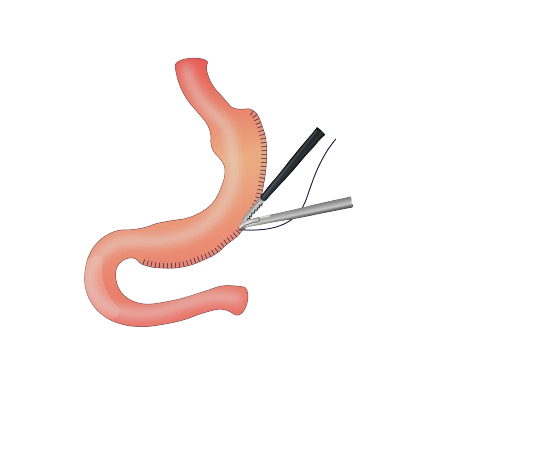
Revision Surgeries
Re-sleeve is the name we give to shrinking the growing stomach tube again by re-cutting or folding and sewing it. A frequently performed and effective revision surgery. It has almost no malabsorption effect.
Once the stomach has been reduced in size, it becomes more difficult to grow again. This reduces the risk of weight gain again after re-sleeve. After gastric sleeve surgery, the stomach tube may expand from the top and bottom. Since the expansion of the upper part will increase food intake, an unstoppable weight gain begins. In the re-sleeve operation, these expanded upper and lower stomach parts are removed and stitched again.
Why Does Weight Gain After Gastric Sleeve Surgery?
Weight gain after sleeve gastrectomy surgery is a problem that may be encountered at different rates depending on the time after surgery. We can examine this problem in three stages.
- Those who cannot lose enough weight in the first 6 months after surgery
- People who lose weight after surgery but regain weight in less than 3 years
- Those who gain weight after 5 years after surgery.
The most common reason in the first group is that the stomach cannot be reduced sufficiently as standard in sleeve gastrectomy surgery. Rarely in this group, insufficient weight loss may be observed in sedentary women over the age of 45, even if the stomach is reduced to a standard size. Of course, even if there is no technical problem in this group, they may gain weight because they do not have a proper lifestyle. Again, sedentary women over the age of 45 can be included in this group. In the third group, although it is performed in accordance with the gastric sleeve surgery technique, long-term weight gain is often due to lifestyle changes.
Why Do We Gain Weight Again After Gastric Sleeve Surgery?
- Failure to perform sleeve gastrectomy surgery in accordance with its technique
- Although the sleeve gastrectomy surgery is performed in accordance with the technique, the person returns to inappropriate eating habits
- Rarely, a clear reason for weight gain may be revealed despite sleeve gastrectomy surgery. It can be interpreted that the metabolic responses of these people are different.
Gastric Sleeve or Gastric Bypass, Which One Has More Weight Gain?
Gastric sleeve surgery is as effective as gastric (stomach) bypass surgery when performed in accordance with standards. After gastric bypass, the connection between the stomach pouch and the intestine expands over time and the amount of food consumed by the patient at a time increases and weight gain begins. RNY gastric bypass surgery has very little malabsorption effect. The malabsorption effect is much greater in bypass surgeries such as mini bypass, duodenal switch or transit bipartition. Even in bypass surgeries, which have a high malabsorption effect, weight gain begins when the amount of food consumed at a time increases. In general, in bypass surgeries, when the connection between the newly created small stomach pouch and the intestine expands, weight gain begins again. Therefore, in obesity surgery methods, the effect that keeps the person at the weight he lost is essentially a restrictive effect. When the restrictive effect on food intake decreases, weight gain begins despite the malabsorption effect. Gastric sleeve surgery or gastric bypass surgery carry the risk of weight regain at similar rates.
Based on our experience, we recommend that gastric sleeve surgery be performed first, and if weight gain occurs again, gastric bypass surgery should be performed in the second stage. In fact, most of the time, when there is weight gain after sleeve gastrectomy surgery, we perform another stomach reduction surgery, which we call re-sleeve, before performing gastric bypass surgery.
Gastric Bypass Revisions
Surgeries, which vary depending on people’s weight, lifestyle, age, psychology and diseases, can open the doors to a quality and healthy life for people. However, surgeries may not always produce the expected results. Approximately 10 percent of obesity surgeries performed around the world may not produce the results patients expect. There may even be patients who face the opposite results. If a patient undergoing obesity surgery cannot lose even half of his or her excess weight within 18 months, the surgery is considered a failure. On the other hand, complications that occur a long time after the surgery or starting to gain weight again indicate that the operation was unsuccessful. Failures can sometimes occur due to surgery and sometimes to what happens after the surgery. If the patient does not get the expected results after bariatric surgery, revision stomach surgeries are deemed necessary.
Revisional Gastric Surgeries
Although obesity surgery has been performed successfully, there is a possibility that patients may not be satisfied with their weight loss. If the patient continues bad eating habits and maintains a sedentary lifestyle, weight regain may occur.
Our main goal is making you lose weight and maintaining it. Our bariatric team follows you on every step you take on your weight loss journey. Close follow up with bariatric team makes it easy to reach your weight loss goal.


